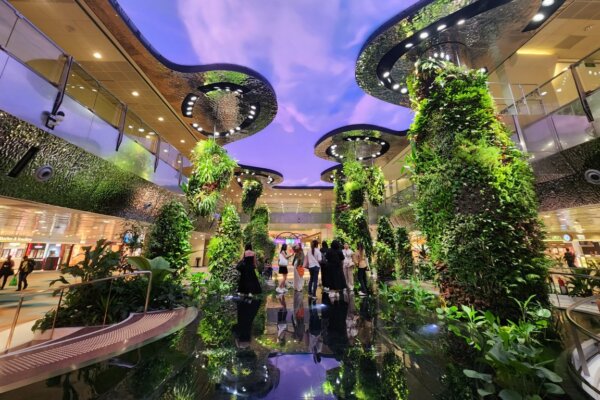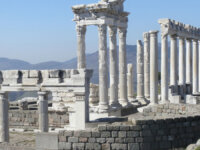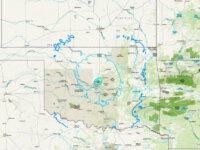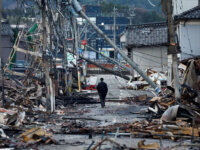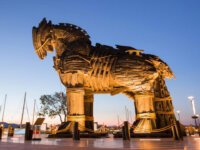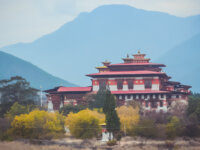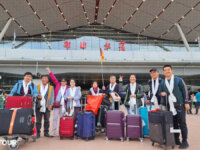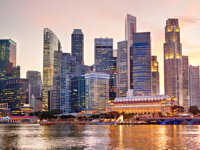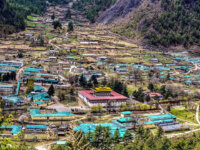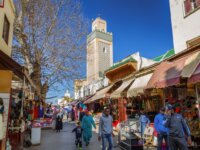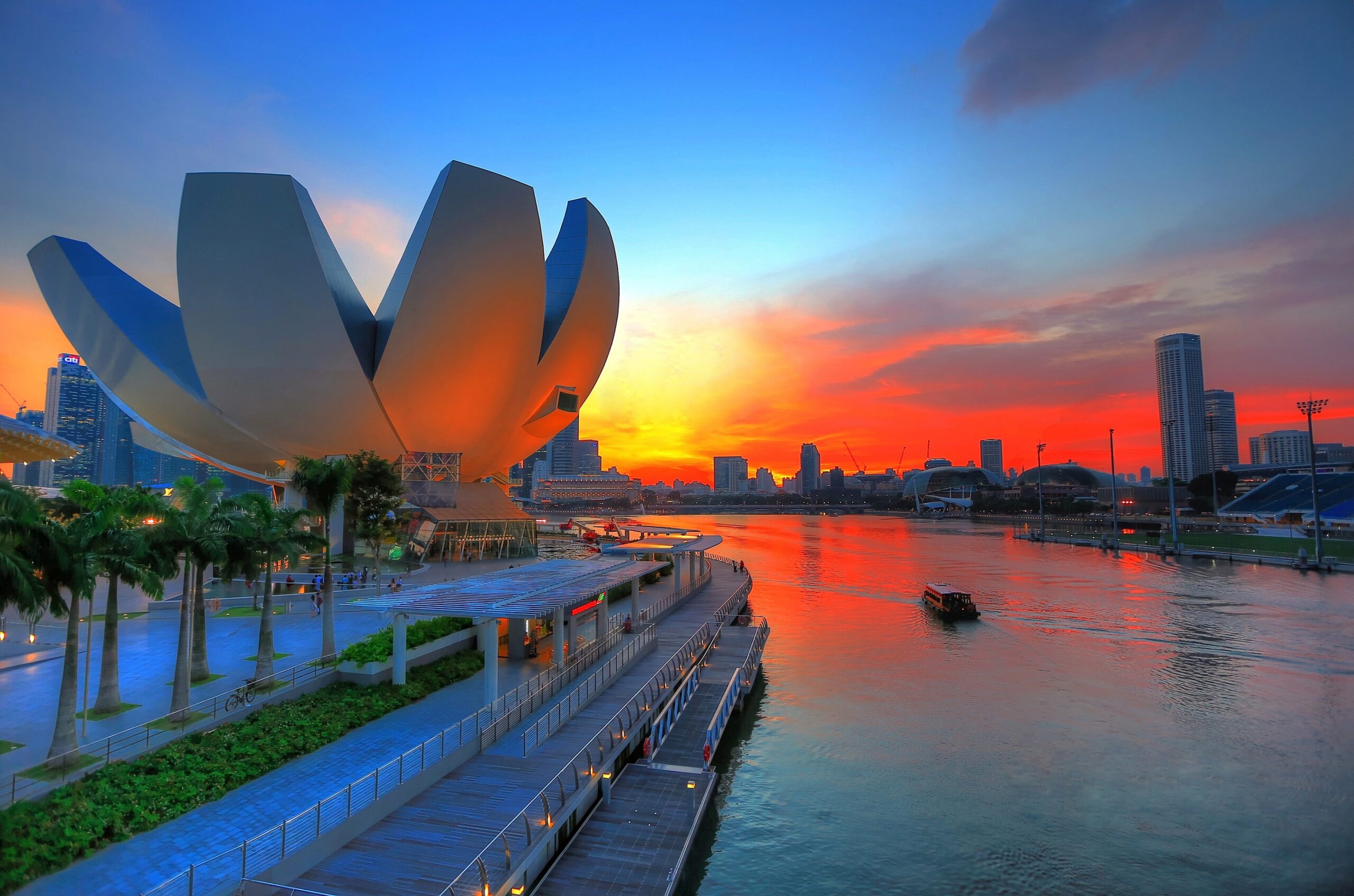CHINA – Chengdu, renowned for its beloved giant pandas and delectable Sichuan cuisine, is a city that effortlessly combines modernity with a laid-back atmosphere.
This sprawling metropolis offers a treasure trove of natural wonders, cultural gems, and historical masterpieces both within its confines and in the surrounding areas.

The Giant Buddha Statue of Leshan
Whether you’re seeking the allure of famous residents or the flavorsome charm of its cuisine, Chengdu has something for everyone to savor and explore.
Exciting Attractions in Chengdu
Apart from the obligatory cuddling with adorable pandas, Chengdu boasts numerous sites in various styles to give you a glimpse into its unique culture, history, and a taste of local life.
Chengdu Research Base of Giant Panda Breeding

Bifengxia Panda Base
The home of the beloved giant pandas, this research and breeding center allows you to get up close and personal with these adorable creatures in their natural habitat.
Explore in More Detail:
- Bifengxia Panda Base
- Wolong National Nature Reserve
- Chengdu Research and Breeding Base for Giant Pandas
- Dujiangyan Panda Base in Chengdu
Learn More: Top Panda Viewing Locations in China.”
Wuhou Temple

Wuhou Temple (Chengdu)
A historical shrine dedicated to Zhuge Liang, the famous strategist of the Three Kingdoms period, and Liu Bei, his lord. The shrine complex provides profound insights into ancient Chinese culture and history.
Jinli Ancient Street

Jinli Ancient Street
A bustling ancient street with traditional Chinese architecture, teahouses, souvenir shops, and local snacks. It’s a fantastic place to experience Chengdu’s vibrant street culture.
Chunxi Road
A renowned shopping and entertainment district in Chengdu, featuring a multitude of stores, restaurants, and entertainment options.
Sichuan Museum
This museum showcases an impressive collection of artifacts related to the history, culture, and art of Sichuan. It’s an excellent place to learn about the rich heritage of the region.
Kuanzhai Xiangzi (Wide and Narrow Alley)
A well-preserved historic neighborhood with narrow lanes and traditional courtyard houses. It offers a glimpse into Chengdu’s past.
Du Fu Thatched Cottage Museum
Located just outside Chengdu, this museum houses artifacts from the ancient Du Fu Thatched Cottage civilization, including enigmatic bronze masks and sculptures.”
Dujiangyan Irrigation System
An ancient marvel of hydraulic engineering that has irrigated the Chengdu Plain for over 2,000 years. It is a UNESCO World Heritage Site and a testament to China’s ancient water management.
While you might think of Dujiangyan as just an irrigation project, you’ll be pleasantly surprised by the impressive architecture of the ancient town in this area!
Mount Qingcheng
A beautiful mountain area with lush greenery, ancient temples, and long hiking trails. It’s known as one of the birthplaces of Daoism and provides a peaceful escape from the city.
Jiuzhaigou Valley
Located outside of Chengdu, this UNESCO-recognized national park is renowned for its stunning natural landscapes, including colorful lakes, waterfalls, and snow-capped peaks.
Explore all the top attractions in Chengdu in detail: Interesting Places and Activities in Chengdu
Chengdu, the Culinary Destination
Chengdu, the first UNESCO-recognized City of Gastronomy, is renowned for its delectable cuisine. You’ve undoubtedly heard of famous Chinese dishes like Kung Pao Chicken and Mapo Tofu.

Chengdu’s Street Food at Night
Chengdu is a favorite destination for food enthusiasts, and the city is famous for its vibrant street food scene and iconic Sichuan Hotpot.

Chengdu Street Food
Jinli Ancient Street is an excellent place to explore the street food of Chengdu. Here, you can savor delicious dishes like spicy Dan Dan noodles, skewered spicy chicken, and spicy rabbit meat.
For more detailed information about Chengdu’s tasty dishes, you can check out our comprehensive Chengdu Food Guide.”

Chengdu’s Delicacies
The most intriguing dishes and authentic eateries in Chengdu are often hidden away in the city’s winding alleyways.

Getting to Chengdu
Chengdu Transportation: By Air
Chengdu, a major gateway to southwestern China, boasts two large international airports that cater to both domestic and international travelers.
The primary airport is Chengdu Shuangliu International Airport (CTU), located approximately 16 kilometers (10 miles) from the city center. CTU offers an extensive network of flights with over 220 domestic and 130 international destinations.
Getting from Shuangliu Airport to the Chengdu city center is convenient. The Airport Shuttle operates six routes, including three daytime and three nighttime routes, connecting the airport to various locations in the city such as East and North Chengdu Railway Stations, Wuhou Shrine, and Tianfu Square.

Wenshu Monastery
Fares start at 10 RMB. Additionally, you can take Metro Line 10 from Metro Stations 1 and 2, with detailed English signage guiding you to the airport metro station.
Metro fares are 4 RMB per person. For the quickest option, you can hail an official taxi from the designated taxi stands outside Gate 2 of the Arrival Hall at Station 1 and outside Gates 4 and 5 of the Arrival Hall at Station 2.
A one-way ride to the city center typically costs around 120 RMB.
A brand-new airport, Tianfu International Airport (TFU), opened in June 2021. This airport is situated 51 kilometers (32 miles) southeast of the city center and features two terminals.
To reach the city center from TFU, you can take Metro Line 18 to South Chengdu Railway Station, where you can transfer to Lines 1 and 7 to access various popular locations in the city. Airport shuttles and taxis are also available.

Mount Emei
Chengdu Transportation: By Train, Bus, Metro, Taxi
Chengdu boasts a well-developed transportation network, making it easy for travelers to explore famous attractions through various means such as city buses, taxis, and the metro.
There are currently around 12 metro lines in operation, with plans to add more lines in the future. Language should not be a barrier, as metro stations have bilingual signs, maps, and ticket machines.
As the metro system continues to expand, it’s advisable to download the most up-to-date Metro map when traveling. Fares start at 2 RMB and increase with distance traveled.
Regular metro and bus users may find savings by purchasing the Tianfu Tong Ka, a rechargeable card available at kiosks at the airport and major metro stations, providing discounted fares.
Travelers can also use public buses within the city and tourist buses to explore Chengdu.

Du Fu Thatched Cottage in Chengdu
While city buses cover all areas of the city, finding the right route may be challenging for non-Chinese tourists, even with bus stops marked in both Chinese and English.
If you’re moving between major tourist destinations, tourist buses can offer convenience and cost savings. Tickets to your desired destinations can be purchased near many tourist sites, including Tianfu Square, Kuanzhai Xiangzi, and Wuhou Shrine. Prices vary depending on your destination and the type of ticket.
Other transportation options in the city include taking official taxis, with starting fares ranging from 8-12 RMB depending on the vehicle type.

Anshun Bridge in Chengdu
It’s essential to note that taxi drivers may often refuse to use the meter when starting from train stations or long-distance bus terminals. In such cases, negotiate a fixed price with the driver before beginning your journey.
Gateway to Remarkable Landscapes
Chengdu’s strategic location in the eastern edge of the Tibetan Plateau makes it a vital gateway to both Tibet and the western Sichuan scenic areas. Here is additional information:
Gateway to Tibet
- Chengdu is a major transportation hub for travelers heading to Tibet, with numerous flight options to Lhasa, the Tibetan capital.
- The city also serves as the starting point for overland journeys to Tibet by car or train, offering opportunities to explore Tibetan culture and cuisine even before reaching the plateau.
- Chengdu hosts Tibetan communities and restaurants, offering unique Tibetan flavors and traditions.
- For adventurers seeking a journey into the Tibetan Plateau, Chengdu is an ideal launching point.
Explore More Articles: Guide to Traveling from Chengdu to Tibet and Travel Tips for Tibet.

Beautiful Grasslands with Livestock and Lakes
Gateway to Western Sichuan’s Most Beautiful Scenery
- Western Sichuan, accessible from Chengdu, boasts stunning natural beauty, including Jiuzhaigou Valley and Huanglong National Park.
- These parks are renowned for their pristine lakes, vibrant water features, snow-capped peaks, and picturesque landscapes.
- Jiuzhaigou Valley, known for its colorful lakes and waterfalls, is an unmissable destination.
- Travelers can explore these breathtaking wonders with guided tours from Chengdu or plan their adventures.
- The partial reopening of Jiuzhaigou Valley in 2019 provided an opportunity for visitors to appreciate its beauty once again.

Jiuzhaigou Valley in China
Whether you’re interested in the spiritual and cultural allure of Tibet or the spectacular natural beauty of western Sichuan, Chengdu is the gateway to these noteworthy destinations.
Best Time to Visit Chengdu
The best times to visit Chengdu are from March to June and from September to November. During these periods, you can enjoy pleasant weather and avoid the heavy rains that occur in July and August.

Huanglong Ancient Town
Chengdu has a unique basin climate characterized by relatively mild temperatures, but summers can be hot, winters cold, and air pollution may worsen due to high humidity.
Nevertheless, many travelers find Chengdu’s climate quite comfortable, especially when compared to more extreme weather conditions in nearby mountainous regions like Jiuzhaigou and Mount Emei.
For more detailed information on temperature and specific climate details, you can check out the Best Time to Visit Chengdu



